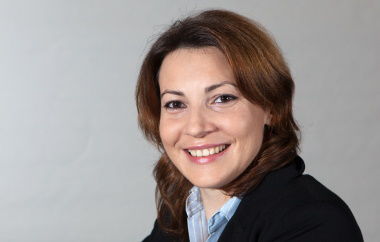PhD in Fine Chemistry
Current position: Assistant Professor at Department of Organic Chemistry, University of Córdoba, Spain
Research focus: green chemistry, materials science, heterogeneous catalysis, biomass valorisation
Alina combines her ingrained sense of sustainability with a PhD in Fine Chemistry and an extremely strong academic record in analytical, physical, and organic chemistry. Her work focuses on alternative and greener methodologies in chemistry, including novel technologies for materials preparation, the production of biofuels, and photocatalysis — a greener alternative for the production of chemicals and energy.
As part of her PhD thesis, Alina brought together three important disciplines — nanomaterials, energy, and environment — and led a multidisciplinary team to develop more sustainable processes for the preparation of supported nanoparticles. Alina and her team prepared and optimised green designer nanomaterials for various energy and environmental applications. This included the production of advanced second generation biofuels and high added-value chemicals as well as biomass valorisation and environmental remediation.
CV as submitted for the Green Talents award (2012):
School of Chemical Technology, Aalto University, Finland
Research focus: green chemistry, heterogeneous catalysis, biomass valorisation
Alina Mariana Balu grew up in rural Romania, where “no-waste” and “sustainability” were not new trends, but ancient practice. Maximising available resources, minimising environmental impact and achieving more with less is, as a result, her natural approach to work and life. Today, she combines her ingrained sense of sustainability with a PhD in Fine Chemistry and an extremely strong academic record in analytical, physical and organic chemistry. Her work focuses on alternative and greener methodologies in chemistry, including novel technologies for materials preparation, the production of biofuels, and photocatalysis – a greener alternative for the production of chemicals and energy.
As part of her PhD thesis, Balu brought together three important disciplines – nanomaterials, energy and environment – and led a multidisciplinary team to develop more sustainable processes for the preparation of supported nanoparticles. “We prepared and optimised green designer nanomaterials for various energy and environmental applications,” explains Balu. “This included the production of advanced second generation biofuels and high added-value chemicals as well as biomass valorisation and environmental remediation.” Balu has edited a book on biomass energy production, co-authored 27 scientific papers and presented at more than 30 international conferences.
The jury was impressed by Balu’s innovative work with designer nanomaterials for greener production processes and emphasized the importance of green chemistry for a more sustainable future.






